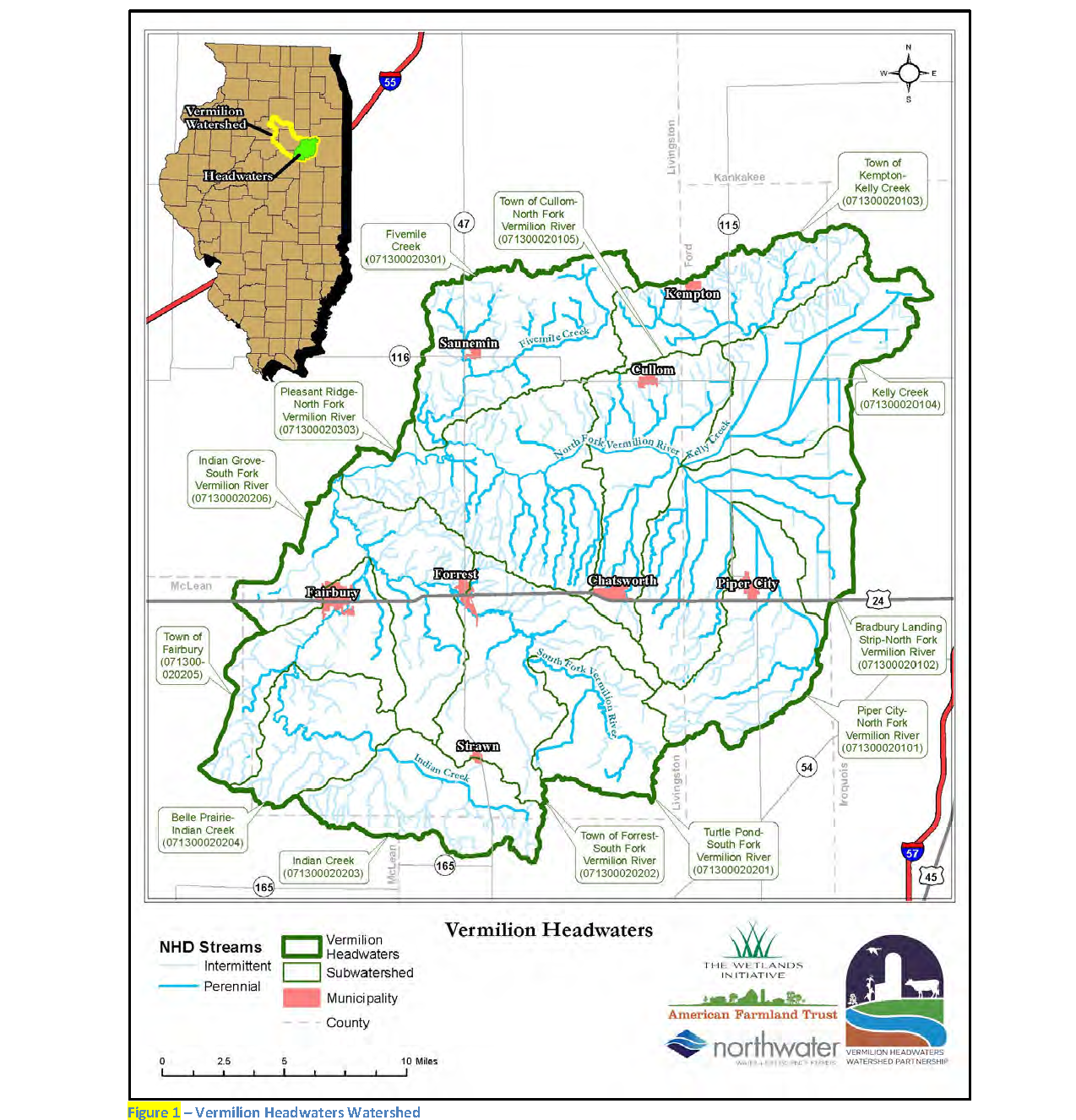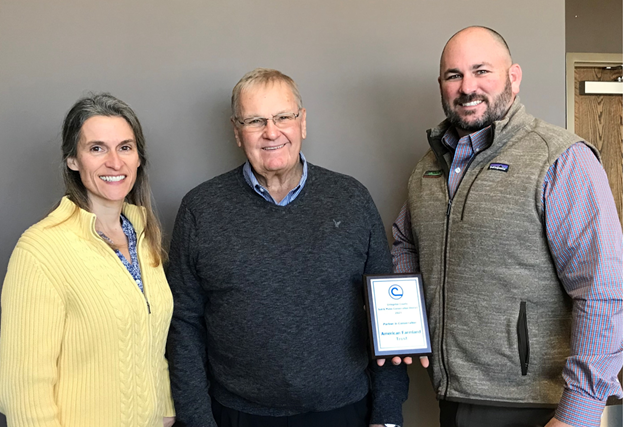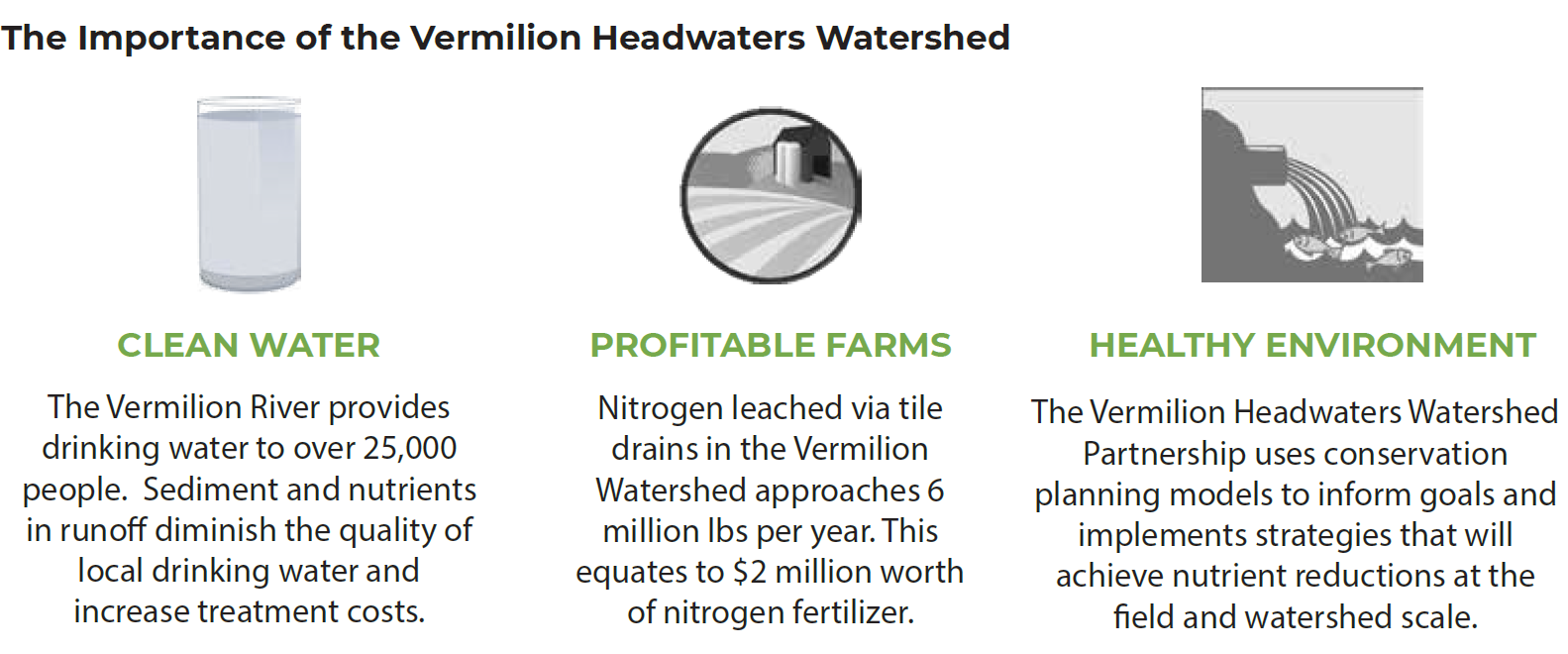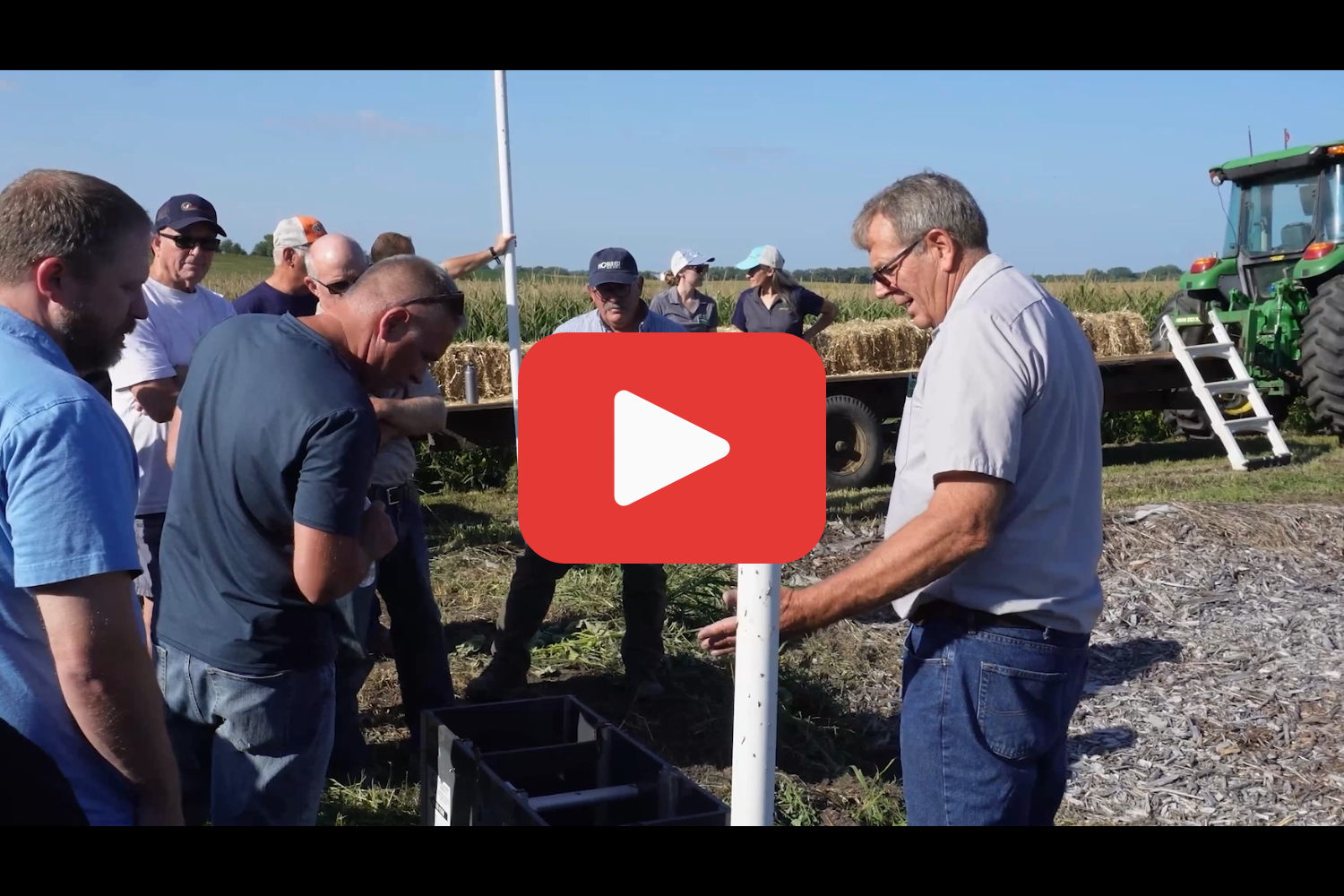Farm families in our Midwest region have stewarded the land for generations, weaving stories of crops and community. American Farmland Trust believes the health of the soil and waters aren’t just present concerns—it’s the lasting legacy these farmers are building. The Vermilion Headwaters Watershed Partnership asked farmers to answer why soil and water protection matter deeply to them and their communities, here is what they shared.
Vermilion Headwaters Watershed Partnership
Improve soil health and water quality on your farm!
American Farmland Trust is working with local stakeholders through the Vermilion Headwaters Watershed (VHW) Partnership to support the adoption of well-managed conservation cropping systems, leading to improvements in water quality and soil health. If you farm in Livingston or Ford Counties, Illinois and/or have farmland in the Vermilion Headwaters Watershed, there are many technical and financial resources available to help you reduce tillage, increase nutrient efficiency, and implement cover crops. American Farmland Trust and the VHW Partnership can help you identify conservation practices to achieve your soil health and water quality goals.
NEW: VHW Watershed-Based Plan
AFT, The Wetlands Initiative, and Northwater Consulting recently finished work on a watershed plan for the Vermilion Headwaters Watershed. The plan was made possible by a grant from the Illinois EPA, and includes information on nutrient loading in the watershed, proposed locations for best management practices, and a comprehensive education and outreach plan.
Click here to view the full plan!
Map

Recent News
American Farmland Trust was recently named “Partner of the Year” by the Livingston County Soil and Water Conservation District, recognizing our leadership in the VHW Partnership and our work with farmers to implement practices that reduce nitrogen loss. AFT is currently leading the development of a 9-element watershed plan and has hired a Conservation Technician, Jake Haar, to work one-on-one with farmers in the VHW. Located in the Livingston County NRCS office, Jake assists farmers in achieving their goals by addressing natural resource concerns. Through a Compeer Financial Grant, he is working to establish a farmer-to-farmer network to streamline the conservation effort. He understands that every farming operation is different, putting key informational resources together through a farmer led network will be pivotal in achieving conservation goals.

What is the VHW Partnership?
The Vermilion Headwaters Watershed Partnership is a collaboration of stakeholders, including farmers, community leaders, government agencies, research institutions, and non-profit organizations, working to reduce the loss of nitrogen from farmland in the VHW. By adopting conservation cropping systems, which include practices such as reduced tillage, cover crops, nutrient management, and tile water treatment, farmers can help protect water quality and improve their bottom line.

The Vermilion Headwaters Watershed is a 305,573-acre rural watershed encompassing parts of Livingston, Ford, Iroquois, and McLean Counties in Illinois. This watershed has been identified as one of the top five non-point source nitrogen loading watersheds in Illinois and is a major contributor to nitrogen loading in the Mississippi River. The watershed has also been identified as a high priority watershed by the Illinois Nutrient Loss Reduction Strategy.
VHW partners include American Farmland Trust, NRCS, The Wetlands Initiative, Livingston and Ford Counties Soil and Water Conservation Districts, Precision Conservation Management, and Compeer Financial. These partners are working together to develop a 9-element watershed plan to achieve water quality goals within the Vermilion Headwaters. The watershed management plan includes an overview of the current conditions of the watershed, including physical, chemical, and biological characteristics of the stream network, as well as current land use and potential sources of impairment.
How Can Farmers Get Involved and What Are the Benefits?
Many farmers in the watershed are already successfully implementing conservation practices to reduce non-point source nitrogen loading and improve their profitability. Farmers in the watershed are encouraged to get involved by adopting conservation practices that improve soil health and economic returns. Through engaging with the VHW partnership, farmers can gain technical and financial assistance to try reduced tillage, efficient nutrient management, and cover crop adoption.
For a brief overview of Farm Bill cost-share programs, Click Here
Through individual action, farmers in the watershed can collectively improve water quality while maintaining or improving farm profitability. The adoption of a well-managed conservation cropping system leads to improvements in a farmer’s bottom line by contributing to:

Resources for the Vermilion Headwaters Watershed
Planting cover crops, reducing tillage, and reducing nitrate loss from fields are some of the most efficient management options for increasing soil health while decreasing nutrient and soil loss from fields. Download the resources below so you can maximize on-farm benefits for your operation!
What We’ve Done
The farmers, government agencies, non-profit organizations, agriculture professionals, and area residents that comprise the Partnership are working to further increase the efficiency of nitrogen management in Ford and Livingston Counties in Illinois. As part of this effort, AFT is working with our partners to use conservation planning models to inform the development of new watershed goals that outline a clear path toward achieving nutrient reductions at the field and watershed scale. AFT is working diligently on a 9-element watershed plan to address water quality and natural resource concerns. The plan will provide a detailed approach and target key areas for best management practice implementation.
Since 2015, more than $1.7M has been invested in conservation practices in the watershed as an extension of our partnership with the Livingston and Ford County Soil and Water Conservation Districts and the Natural Resources Conservation Service. We strive to provide farmers with the technical and financial assistance necessary to improve environmental performance without sacrificing productivity and acknowledge that reduced tillage is an important first step in a conservation cropping system that successfully utilizes cover crops.
In August 2021, the VHW Partnership invited Illinois farmers to participate in a conservation ag field tour of the Vermilion Headwaters Watershed. Producers were encouraged to join their peers from Livingston and Ford Counties to explore the benefits of strip-till, nutrient management, cover crops, and constructed wetlands. The event, which brought together nearly 50 farmers, conservation professionals, and ag advisors, was hosted by Craig Swartz of Swartz Farms. Stay tuned for upcoming field days!
Field Days
Past Events

Thursday, July 28th 8-10:30am
Zach Grady Farm
33601 County Road 200 N
Chatsworth, IL
Abigail Peterson, ISA, Director of Agronomy – Weed prevention and suppression
Chinmay Soman, EarthSense – Cover crop seeding robot demonstration
Immediately following Field Day was a steering committee meeting to discuss watershed plan.
Need more information?
Connect with one of our AFT staff who is leading this partnership!



